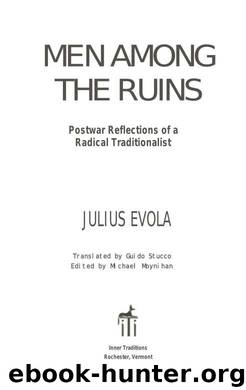Men Among the Ruins by Julius Evola

Author:Julius Evola
Language: eng
Format: azw, pdf
Tags: Among, Traditionalist, Evola, Postwar, Julius, Radical, Men, War, Reflections, Ruins, Tradition
Published: 2015-01-05T05:00:00+00:00
170 WORK-THE DEMONIC NATURE OF THE ECONOMY
through something worse—namely, the "integration (or, we should say, disintegration) of the person into a collective entity (i.e., the "people,' or "the party')."
I am not espousing an "obscurantism" for the benefit of the "ruling classes"; as I have stated previously, I dispute the superiority and the rights of a merely economic class living in a materialistic fashion. Nevertheless, we need to side against the idea or myth of so-called social progress, which is another of the many pathological fixations of the economic era in general, and not the legacy of leftist movements alone. To this effect, the eschatological views of Marxism do not differ very much from the "Western" views of prosperity: both Weltanschauungen [worldviews] essentially coincide, as do their practical applications. In both Marxism and free-market economies we find the same materialistic, antipolitical, and social view detaching the social order and people from any higher order and higher goal, positing what it is "useful" as the only purpose (understood in a physical, vegetative, and earthly sense); by turning the "useful" into a criterion of progress, the values proper to every traditional structure are inverted. In fact, we should not forget that the law, meaning, and sufficient reason for these structures have always consisted in references for man to some-thing beyond himself and beyond the economy, wealth, or material poverty, all these things having only a secondary importance. Thus, it can legitimately be claimed that the so-called improvement of social conditions should be regarded not as good but as evil, when its price consists of the enslavement of the single individual to the productive mechanism and to the social conglomerate; or in the degradation of the State to the "State based on work," and the degradation of society to "consumer society"; or in the elimination of every qualitative hierarchy; or in the atrophy of every spiritual sensibility and every "heroic" attitude. Hegel wrote, "Happiness is not to be found in the history of the world [in the sense of material comfort and social prosperity]; even the few happy periods found here and there are like white pages." But even at an individual level, the qualities that matter the most in a man and make him who he is often arise in harsh circumstances and even in conditions of indigence and injustice, since they represent a challenge to him, testing his spirit; what a sad contrast it is when the human animal is granted a maximum of comfort, an equal share in a mindless and bovine happiness, an easy and comfortable life filled with gad-gets, radio and TV programs, planes, Hollywood, sports arenas, and popular culture at the level of Reader's Digest.
Again, spiritual values and the higher degrees of human perfection have
WORK-THE DEMONIC NATURE OE THE ECONOMY 171
nothing to do with either the presence or the absence of socioeconomic prosperity. The notion that indigence is always a source of abjection and vice—and that "advanced" social conditions represent its opposite—is the fairy tale told by materialistic
Download
This site does not store any files on its server. We only index and link to content provided by other sites. Please contact the content providers to delete copyright contents if any and email us, we'll remove relevant links or contents immediately.
Becoming Supernatural by Dr. Joe Dispenza(8217)
Crystal Healing for Women by Mariah K. Lyons(7930)
The Witchcraft of Salem Village by Shirley Jackson(7274)
Inner Engineering: A Yogi's Guide to Joy by Sadhguru(6794)
The Four Agreements by Don Miguel Ruiz(6765)
The Power of Now: A Guide to Spiritual Enlightenment by Eckhart Tolle(5781)
Secrets of Antigravity Propulsion: Tesla, UFOs, and Classified Aerospace Technology by Ph.D. Paul A. Laviolette(5371)
The Wisdom of Sundays by Oprah Winfrey(5161)
Room 212 by Kate Stewart(5120)
Pale Blue Dot by Carl Sagan(5008)
Fear by Osho(4738)
The David Icke Guide to the Global Conspiracy (and how to end it) by David Icke(4718)
Animal Frequency by Melissa Alvarez(4471)
Rising Strong by Brene Brown(4459)
How to Change Your Mind by Michael Pollan(4356)
Sigil Witchery by Laura Tempest Zakroff(4243)
Man and His Symbols by Carl Gustav Jung(4135)
The Art of Happiness by The Dalai Lama(4130)
Real Magic by Dean Radin PhD(4129)
